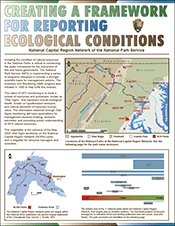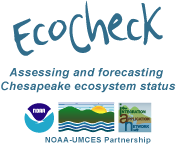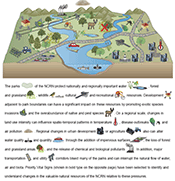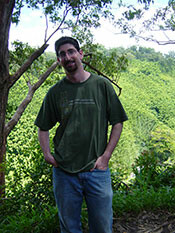Creating a framework for reporting ecological conditions
 A new science newsletter created for the National Capital Region Network (NCRN) of the National Park Service is now available on the IAN website. This newsletter is the product of the May 2005 Vital Signs workshop, with participants from each of the 11 National Parks within the NCRN. Knowing the condition of natural resources in the National Parks is critical to conserving the parks unimpaired for the enjoyment of this and future generations. The National Park Service (NPS) is implementing a series of programs designed to provide a stronger scientific basis for management actions. The Inventory and Monitoring (I&M) program was initiated in 1990 to help fulfill this mission. The intent of NPS monitoring is to track a subset of resources and processes, known as “Vital Signs,” that represent overall ecological health, known or hypothesized stressors, and natural elements of important human value. The information obtained through Vital Signs monitoring will have applications for management decision-making, research, education and promoting public understanding of NPS natural resources.
A new science newsletter created for the National Capital Region Network (NCRN) of the National Park Service is now available on the IAN website. This newsletter is the product of the May 2005 Vital Signs workshop, with participants from each of the 11 National Parks within the NCRN. Knowing the condition of natural resources in the National Parks is critical to conserving the parks unimpaired for the enjoyment of this and future generations. The National Park Service (NPS) is implementing a series of programs designed to provide a stronger scientific basis for management actions. The Inventory and Monitoring (I&M) program was initiated in 1990 to help fulfill this mission. The intent of NPS monitoring is to track a subset of resources and processes, known as “Vital Signs,” that represent overall ecological health, known or hypothesized stressors, and natural elements of important human value. The information obtained through Vital Signs monitoring will have applications for management decision-making, research, education and promoting public understanding of NPS natural resources.
Wanted: Science Applications Coordinator
 The Integration and Application Network (ian.umces.edu) invites applications for a Science Applications Coordinator. The position requires a strong background in estuarine science with strong skills in quantitative and qualitative information processing and technical writing and graphics. The successful candidates will work in partnership with the NOAA Chesapeake Bay Office staff at the Cooperative Oxford Laboratory in Oxford, Maryland. Candidates should have at least a Bachelor’s degree. The successful candidate must possess demonstrated experience in two or more of the following areas; data interpretation and communication, technical writing, and ability to produce synthetic reports. This person will be responsible for producing a range of science application products related to, or resulting from, the Partnership’s development of ecological assessment and forecasting techniques. For further information, please visit the EcoCheck website.
The Integration and Application Network (ian.umces.edu) invites applications for a Science Applications Coordinator. The position requires a strong background in estuarine science with strong skills in quantitative and qualitative information processing and technical writing and graphics. The successful candidates will work in partnership with the NOAA Chesapeake Bay Office staff at the Cooperative Oxford Laboratory in Oxford, Maryland. Candidates should have at least a Bachelor’s degree. The successful candidate must possess demonstrated experience in two or more of the following areas; data interpretation and communication, technical writing, and ability to produce synthetic reports. This person will be responsible for producing a range of science application products related to, or resulting from, the Partnership’s development of ecological assessment and forecasting techniques. For further information, please visit the EcoCheck website.
Research Opportunity in Environmental Science
 A graduate student fellowship is available to work in a cooperative research program established between the University of Maryland Center for Environmental Science (UMCES) and National Park Service (NPS). The purpose of this partnership is to enhance the integration of ecological data into environmental decision making. The successful applicant will synthesize park-based monitoring data, which include air, water, and biological resources, for the purpose of communicating trends or thresholds for ecological indicators (“vital signs”). One anticipated outcome of the fellowship will be to highlight the ecological value and regional context of National Parks within an urbanized setting. The student will have substantial interaction with statisticians, landscape ecologists, and science integrators/communicators collaborating on the project. The student will be based at the University of Maryland Center for Environmental Science, (www.umces.edu) and will be enrolled through the Marine Estuarine and Environmental Studies (www.mees.umd.edu) program of the University System of Maryland. Travel to National Capital Region parks and the NPS Center for Urban Ecology (www.nps.gov/cue) is also expected. The fellowship will cover stipend, tuition, travel and supplies. For more information contact Bill Dennison or Tim Carruthers (ian.umces.edu).
A graduate student fellowship is available to work in a cooperative research program established between the University of Maryland Center for Environmental Science (UMCES) and National Park Service (NPS). The purpose of this partnership is to enhance the integration of ecological data into environmental decision making. The successful applicant will synthesize park-based monitoring data, which include air, water, and biological resources, for the purpose of communicating trends or thresholds for ecological indicators (“vital signs”). One anticipated outcome of the fellowship will be to highlight the ecological value and regional context of National Parks within an urbanized setting. The student will have substantial interaction with statisticians, landscape ecologists, and science integrators/communicators collaborating on the project. The student will be based at the University of Maryland Center for Environmental Science, (www.umces.edu) and will be enrolled through the Marine Estuarine and Environmental Studies (www.mees.umd.edu) program of the University System of Maryland. Travel to National Capital Region parks and the NPS Center for Urban Ecology (www.nps.gov/cue) is also expected. The fellowship will cover stipend, tuition, travel and supplies. For more information contact Bill Dennison or Tim Carruthers (ian.umces.edu).
New IAN Graduate Student
 Ben Fertig has joined UMCES as a graduate student in the Marine Estuarine and Environmental Science program of University of Maryland. Ben will be working on his Master’s degree with Drs. Bill Dennison, Tim Carruthers, Roger Newell and Tom Fisher, developing the eastern oyster, Crassostrea virginica, as a biological indicator of nitrogen sources using stable isotope techniques. Ben will be located at the Integration and Application Network and Horn Point Laboratory in Cambridge, MD. Previously, he was an editor of the Aquatic Sciences and Fisheries Abstracts (ASFA) and the Oceanic Abstracts at CSA and published two Hot Topic articles there. Ben holds a BA in Biology from Brandeis University, in Waltham, MA. In spare moments, he enjoys weekend traveling with his new wife, Elana, and caring for 3 crested geckos. Please join us in welcoming Ben to the Integration and Application Network of UMCES.
Ben Fertig has joined UMCES as a graduate student in the Marine Estuarine and Environmental Science program of University of Maryland. Ben will be working on his Master’s degree with Drs. Bill Dennison, Tim Carruthers, Roger Newell and Tom Fisher, developing the eastern oyster, Crassostrea virginica, as a biological indicator of nitrogen sources using stable isotope techniques. Ben will be located at the Integration and Application Network and Horn Point Laboratory in Cambridge, MD. Previously, he was an editor of the Aquatic Sciences and Fisheries Abstracts (ASFA) and the Oceanic Abstracts at CSA and published two Hot Topic articles there. Ben holds a BA in Biology from Brandeis University, in Waltham, MA. In spare moments, he enjoys weekend traveling with his new wife, Elana, and caring for 3 crested geckos. Please join us in welcoming Ben to the Integration and Application Network of UMCES.

